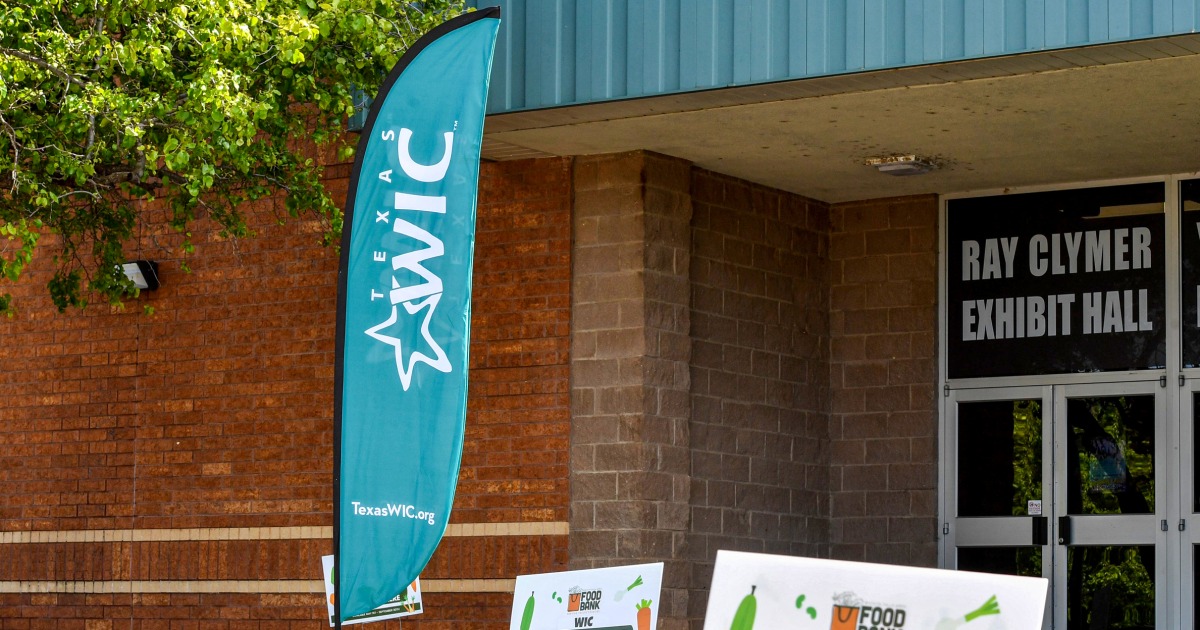Because Wednesday marked the start of the 2026 fiscal year, the WIC program — which provides free, healthy food to low-income pregnant women, new moms and children under 5 — was due for an influx of funding.
Instead came the government shutdown.
If it persists, access to the federal program, known in full as the Special Supplemental Nutrition Program for Women, Infants and Children, could be jeopardized. A USDA letter to WIC state agency directors on Wednesday confirmed that states would not receive their next quarterly allocation of funds during the shutdown.
According to the National WIC Association, a nonprofit advocacy organization that represents state and local WIC agencies, “devastating disruptions” may deny millions of moms and children access to nutritious foods if the government remains closed for longer than a week or two.
Given that Social Security checks will still go out, national parks remain partially open and most Medicaid and Medicare services are continuing, a lapse in WIC funding could be among the first widespread, tangible effects of the shutdown for nonfederal workers.
WIC — a program within the U.S. Department of Agriculture — served roughly 6.8 million people as of April 2022, the most recent data available. It receives funding from Congress, which the USDA then allocates to states on a quarterly basis.
From there, states distribute it to WIC clinics, of which there are roughly 10,000 nationwide. The clinics distribute preloaded cards that members use to purchase program-approved healthy foods at participating grocery stores. New moms can also purchase infant formula and receive lactation counseling.
Barbie Anderson, a mother of three who is pregnant, said she has relied on WIC to purchase healthy food since her oldest child was born nine years ago. Her family lives paycheck to paycheck in Milaca, Minnesota, she added, and the program helps them afford fruits, vegetables, eggs, milk, peanut butter and yogurt. She has also used it for breastfeeding support, she said.
Under normal circumstances, Anderson said, her WIC card would be reloaded on Oct. 15. She’s unsure if that will happen now.
“All the food that we get from WIC goes to our kids. So you’re really harming the kids” if services pause, she said.
During the shutdown, states will have to rely on up to $150 million in contingency funds from the USDA to continue offering services, along with a small amount of rollover funding from the previous fiscal year in some cases, according to the National WIC Association.
The group warned that the funding could dry up in a week or two if the shutdown persists, depending on how states allocate it. Office of Management and Budget Director Russell Vought told House Republicans during a conference call Wednesday that WIC is set to run out of money by next week if the government doesn’t reopen, according to two GOP sources on the call.
“Historically, when there has been a shutdown, WIC has remained open for business, but because this one falls at the start of the fiscal year, there are some risks,” said Georgia Machell, president of the National WIC Association. She called on Congress to pass a funding bill that protects the program and keeps it running without interruption.
A USDA spokesperson told NBC News that WIC’s continued operation will depend on “state choice and the length of a shutdown.”
“If Democrats do not fund the government, the Special Supplemental Nutrition Program for Women, Infants, and Children (WIC) will run out of funding and States will have to make a choice,” the spokesperson wrote in a statement.
However, some House Democrats say the federal government has the power to keep WIC afloat — if the USDA commits to replenishing state funds used during the shutdown after it ends. In a letter to Agriculture Secretary Brooke Rollins, Reps. Bobby Scott, D-Va., and Suzanne Bonamici, D-Ore., called on the USDA to do that.
Without her WIC card, Anderson said, she may have to stop buying oranges for her children, which she feeds them to boost their immune systems.
“My concern is, health wise, my kids’ immunity is going to go down,” Anderson said, adding that if they get sick, she’d also worry about affording doctor’s bills.
Anderson’s family lives in a rural area where options for affordable food are limited. Her WIC benefits allow her to shop at the nearest grocery store, which would otherwise be outside her budget, she said: A gallon of milk there costs roughly $5.
“We could go buy chips all day long for 99 cents, if we wanted to, at a run-down grocery store. But what’s that nutrition for our kids? That’s nothing,” she said.
The closest Walmart, where prices are lower, is about 45 minutes away, but the price of gas makes regular shopping there expensive, too, she said.
Anderson said she isn’t eligible for other food assistance programs like the Supplemental Nutrition Assistance Program, also known as food stamps. That program is expected to continue during the shutdown. (WIC generally has a higher income limit than SNAP.)
The ability of WIC clinics to keep functioning will likely vary by state. Brandon Meline, director of maternal and child health at the Champaign-Urbana Public Health District, said he was told that Illinois clinics have sufficient money to last through the month.
But Meline worries about the program being used as a bargaining chip in shutdown politics.
“This is the first time that WIC has ever been sort of dragged into political fray nationally. We hear discussions about SNAP and cash assistance, but WIC has sort of been politically untouchable up until now,” he said.


